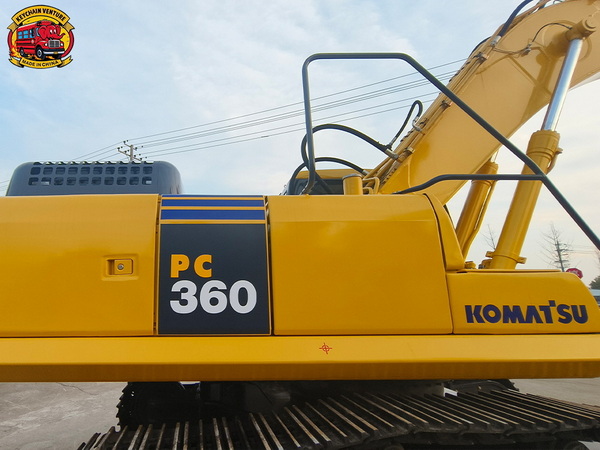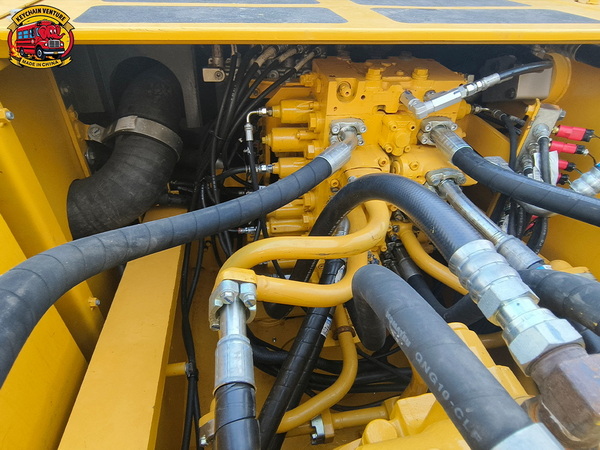Views: 222 Author: Amanda Publish Time: 2025-08-21 Origin: Site








Content Menu
● Introduction to Excavator Fuel Consumption
● Diesel Consumption by Excavator Size
>> Medium Excavators 10-20 ton range
>> Large Excavators 50 tons and above
● Factors Influencing Diesel Usage
● Fuel Efficiency in Used Excavator Models
● How to Reduce Diesel Consumption
● Frequently Asked Questions FAQs
>> 1. How much diesel does a used mini excavator consume per hour?
>> 2. What factors impact the fuel efficiency of a used excavator?
>> 3. How can I calculate my excavator's diesel consumption?
>> 4. Are newer used excavators more fuel-efficient than older ones?
>> 5. What are tips to reduce diesel consumption when operating a used excavator?
Excavators are indispensable machines on construction sites and in industrial projects worldwide. Their capability to dig, lift, and move earth and materials efficiently makes them essential in numerous sectors, from infrastructure development to mining. One of the most critical considerations for operating excavators—whether new or used—is fuel consumption, specifically how much diesel an excavator uses per hour. Understanding fuel consumption not only impacts operational costs but also affects project sustainability and equipment selection.
This article dives deep into the diesel usage of excavators across different sizes, explores key factors influencing fuel consumption, explains how used excavators compare in efficiency, and provides practical tips to minimize fuel expenditure while maximizing productivity.

Excavators differ significantly from passenger vehicles in their fuel consumption characteristics. Instead of being measured over distance traveled, their diesel consumption is generally measured in liters per hour L/hr due to their predominantly stationary or slow-moving operation. This metric allows operators and fleet managers to estimate daily and project fuel costs accurately.
Diesel remains the preferred fuel for excavators because of its high energy density, availability, and engine compatibility. The rate of diesel consumption fluctuates based on the excavator's size, the intensity of the workload, and operational techniques. Many modern excavators are equipped with advanced hydraulic systems and eco-modes designed to optimize fuel efficiency without sacrificing performance.
For companies relying on used excavators as cost-effective options, it's essential to understand how fuel consumption trends might differ from newer models, to factor diesel costs into the total cost of ownership, and to select machines that align with operational needs.
Mini excavators are popular for small projects, landscaping, and tasks in confined spaces. Despite their size, they maintain remarkable efficiency.
- Typical diesel consumption ranges from 3 to 6 liters per hour.
- For example, a 23 horsepower mini excavator might consume around 2.2 liters per hour when lightly loaded and between 4 to 5 liters under heavier work conditions.
- Their compact engine designs and hydraulic systems help minimize fuel use during intermittent or light-duty tasks.
Medium-sized excavators are the backbone of most construction sites.
- These models usually consume 10 to 25 liters of diesel per hour, depending on the workload.
- For instance, a 20-ton excavator averages about 15 liters per hour but may vary widely based on job demands such as digging depth, soil type, and duration of continuous operation.
- Diesel consumption in this segment balances power and efficiency, making these machines versatile for various construction and earthmoving tasks.
Large excavators are engineered for heavy-duty applications like mining and large-scale earthworks.
- Their fuel consumption ranges dramatically, often between 40 to 80 liters per hour.
- A prime example includes a 100-ton Liebherr excavator, which averages around 51 liters per hour, aided by sophisticated hydraulic controls and fuel management systems.
- Despite high fuel use, these machines provide unmatched productivity in moving massive volumes of materials efficiently.

Several key elements influence how much diesel an excavator uses. Understanding these can help users make informed decisions and optimize their operations.
- Engine Size and Power Rating: Larger engines inherently burn more fuel. However, modern engine designs are optimized for fuel efficiency under typical work cycles.
- Workload Intensity: Fuel consumption spikes with heavier tasks such as rock excavation or deep trenching compared to lighter tasks like grading or site cleanup.
- Operator Skill: Skilled operators use smoother, more controlled movements and minimize unnecessary idling or overexerting the engine, effectively reducing fuel consumption.
- Machine Maintenance: Properly maintained engines, clean air and fuel filters, and well-tuned hydraulic systems operate closer to their optimal fuel efficiency.
- Machine Age and Condition: Older or poorly maintained used excavators may have decreased efficiency due to wear, engine deposits, or hydraulic leaks, causing increased diesel use.
- Attachment Type: Some attachments, including hydraulic breakers or grapples, can significantly increase fuel demand during use.
- Idle Time: Extensive idling wastes fuel, so managing machine downtime by shutting engines off when not actively working reduces consumption considerably.
The used excavator market plays a critical role for buyers seeking balance between cost and efficiency. Used excavators can provide substantial savings but require scrutiny regarding fuel consumption.
Leading brands like Komatsu, Volvo, and Caterpillar have developed models known for their fuel-efficient hydraulics and engine controls. When buying used, these features remain impactful but may degrade if the machine has not been properly maintained.
Typically, a well-maintained used medium excavator consumes fuel close to its newer counterparts—around 15 liters per hour for a 20-ton model—while neglected machines might consume 10-20% more diesel. Therefore, inspection for service history, engine hours, and fuel usage logs is paramount.
Fleets often install fuel monitoring systems on used excavators to track consumption patterns and identify issues promptly, ensuring operational efficiency even with older units.
Reducing diesel use not only saves money but also lowers environmental impact. Here are proven strategies for operational efficiency:
- Reduce Idle Time: Turn off the engine during breaks instead of letting the machine idle. Idle fuel consumption can waste up to 30% of the daily fuel budget.
- Right-Sizing Equipment: Match the excavator size to the job. Avoid using large machines unnecessarily on light tasks or overburdening smaller machines.
- Optimize Throttle and RPM: Use eco-modes or low RPM settings where possible without compromising task performance.
- Regular Maintenance: Conduct routine inspections and service, focusing on air and fuel filters, hydraulic components, and engine tuning.
- Efficient Work Planning: Minimize machine travel by organizing tasks to reduce unnecessary movements and repositioning.
- Operator Training: Skilled operators reduce fuel consumption by avoiding aggressive digging, abrupt starts and stops, or excessive swinging.
Adopting these measures can significantly decrease fuel costs across a fleet, increase machine lifespan, and improve project profitability.
Diesel consumption is a critical metric for excavator operators, impacting cost, efficiency, and environmental footprint. The range in fuel use per hour spreads widely from small, nimble mini excavators consuming as little as 2 liters to massive rigs using over 80 liters in intense applications. Each machine's fuel use depends on size, workload, operator handling, and maintenance condition.
Used excavators remain viable options when selected carefully with attention to their fuel efficiency and upkeep. Employing best practices such as reducing idle time, matching machine size to task, regular maintenance, and skilled operation can greatly improve diesel usage rates.
For construction managers, fleet owners, and operators, understanding and controlling fuel consumption maximizes operational sustainability and profitability, ensuring your excavator investment delivers exceptional value over its working life.

Used mini excavators commonly use between 2 to 5 liters per hour depending on workload and machine condition.
Fuel efficiency is affected by engine size, workload, operator skill, maintenance quality, machine age, attachment use, and idle time.
Record fuel added minus remaining fuel over operation hours; divide fuel used by hours worked for average liters per hour.
Yes, newer used excavators often feature improved engine and hydraulic systems, making them more fuel-efficient than older models.
Reduce idle time, use correctly sized machines, optimize throttle, plan work efficiently, maintain the machine, and train operators.
[1] https://www.ecolow.fr/en/excavator-fuel-consumption/
[2] https://www.usedtruckexcavator.com/excavator-fuel-consumption/
[3] https://ahmcorp.com/blogs/beginner-guide/how-much-fuel-does-your-mini-excavator-really-use
[4] https://www.youtube.com/watch?v=1IASxEVf0AM
[5] https://www.vikfin.co.za/post/the-true-cost-of-owning-and-operating-an-excavator-a-comprehensive-guide
[6] https://whchire.com/resources/a-guide-to-budgeting-fuel-costs-for-small-excavators/
[7] https://www.mechandlink.com/en/news-article/Excavator-Brands-Comparison-Which-Used-Model-Is-Best-for-Your-Needs
[8] https://www.reddit.com/r/Heavy_Equipment/comments/1eab9s6/how_much_fuel_does_an_excavator_use_per_hour/
[9] https://www.youtube.com/watch?v=tPzeh4zNBDE
[10] https://quipli.com/resources/how-much-does-an-excavator-cost/
[11] https://ahmcorp.com/blogs/news/how-much-fuel-does-a-1-ton-mini-excavator-use-per-hour
[12] https://www.tatahitachi.co.in/category/mini-excavators/
[13] https://www.reddit.com/r/heavyequipment/comments/n14k77/fuel_consumption_of_a_cat_excavator_350/
[14] https://www.youtube.com/watch?v=9Gz3ZbrGqxE
[15] https://isohitech.com/how-much-does-an-excavator-cost/
[16] https://wheelercat.com/wp-content/uploads/2023/01/Cat-Performance-Handbook-from-VST-fuel-consumption-2022-12-09T21-20-09.pdf
[17] https://www.hitachicm.com/eu/en/onsite/article/reducing-fuel-consumption-of-construction-machinery/
[18] https://www.heavyequipmentforums.com/threads/fuel-consumption.5804/
[19] https://www.youtube.com/watch?v=k3LdwoolNMg
[20] https://growthpower.jp/English/excavators
Field Visit To DR Congo – Products in Action, Friendships in Progress
Treat Your Team to the Perfect Ending: A Cultural Day & Rejuvenating Massage
Just received this absolutely gorgeous bouquet specially ordered by our lovely customer!
Truly inspiring conversations today with our highly insightful client!
Today, we visited the bus company together with our client. It was really wonderful!
A Milestone Moment: Custom Buses Successfully Shipped, Setting Course for New Horizons
Forging Stronger Ties: Welcoming Key African Partners to Chongqing for Transport Collaboration